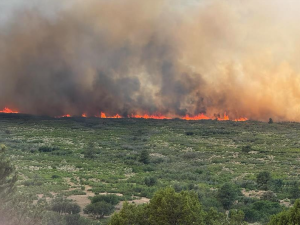Eco groups join Eagle County in rail line challenge
New line in Utah could put lots of oil next to the Colorado River through Western Colorado

This story has been corrected. Glenwood Springs, not Garfield County, is among local governments opposed to the Uinta line.
A federal court in Washington, D.C., will hear a challenge from Eagle County and a number of environmental groups to a proposed new rail line in Utah.
The county earlier this year challenged in federal court the Uinta Basin line approval by the U.S. Surface Transportation Board. That line would originate in the state’s Uinta Basin, then roll about 85 miles south to link up with the Union Pacific rail line near Price, Utah.
The focus of the challenge is that the federal board acted before receiving full information from an environmental review of the project.
The county’s court challenge has been joined in the same case by a number of nonprofit groups including the Sierra Club, the Center for Biological Diversity, Utah Physicians for a Healthy Environment and WildEarth Guardians.

Support Local Journalism
Eagle County Commissioner Matt Scherr said including the environmental groups in the challenge “definitely helps” its prospects.
Scherr said part of the challenge will include possible environmental damage from the line as oil trains — as many as 10 per day hauling up to 350,000 barrels of oil per day — roll up the Union Pacific line through the county.
Scherr noted the potential dangers of shipping that much oil right along the river. In addition, Scherr said, from a climate perspective, it’s important to find alternatives to sending oil and gas to market.
The Union Pacific line through Colorado parallels the Colorado River in many places, from the Colorado-Utah border east to the river’s headwaters, then through the Moffat Tunnel through the Continental Divide.
Support in Utah
The project — estimated to cost $1 billion or more — is backed by a local government group called the Seven County Infrastructure Coalition. It also received support from Utah’s entire congressional delegation. But opposition has come from a host of local governments in Colorado.
Counties include Eagle and Grand counties, where the line runs close to the river in many areas. Other counties include Boulder, Clear Creek, Pitkin, San Miguel and Ouray counties.
Cities and towns include Avon, Eagle, Gypsum, Glenwood Springs, Hot Sulphur Springs and Granby on the Western Slope, along with Front Range communities including Fort Collins, Golden and Longmont.
Deeda Seed, the public lands senior campaigner for the Center for Biological Diversity, said the rail line, if built, will be “hugely consequential.” Seed noted that the environmental impact statement for the project noted that the estimated carbon emissions from the project could be 53 metric tons per year.
“That’s probably conservative,” Seed said.
Seed noted that before linking with the existing rail line, the proposed new line would roll through U.S. Forest Service and private property, and could impact habitat for sage-grouse, a threatened species, as well as a number of plants on the federal endangered and threatened lists.
Tennessee Pass in play?
In addition to concerns about putting that many new trains — which could each be 2 miles long — on the existing lines, Seed said those trains could affect the Tennessee Pass line between, roughly, Dotsero and Canon City.
Seed said there’s already a lot of traffic on the Moffat Tunnel line. Adding more traffic could bring pressure to reopen the Tennessee Pass line, she said. That line wouldn’t carry oil, but other cargo could be put on that often-steep line.
The Tennessee Pass line runs up the Eagle River Valley from Dotsero to the top of Tennessee Pass, then along the Arkansas River into Canon City. That proposal brought a number of objections from residents and local governments along the line. The Surface Transportation Board in May 2021 rejected a plan to reopen the line.
Scherr said the environmental questions about the line boil down to whether the rail line’s approval was properly decided.
Seed agreed, saying that opponents believe the environmental impact statement is flawed.
“There was a lot not taken into account,” she said. For instance, the study didn’t include prospects of a derailment. In her view, the applicants said, in essence, “We plan to make a plan.”
“That’s why we’re suing,” she said.











